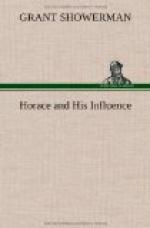“I_n the grave sweetness of whose
tranquil eyes_
O_f emerald, broad and still reflected,
dwells_
A_ll the divine green silence of the plain_.”
We are made to see the sterile rust on the corn, and to feel the blazing heat of dog-days, when not a breath stirs as the languid shepherd leads his flock to the banks of the stream. The sunny pastures of Calabria lie spread before us, we see the yellow Tiber at flood, the rushing Anio, the deep eddyings of Liris’ taciturn stream, the secluded valleys of the Apennines, the leaves flying before the wind at the coming of winter, the snow-covered uplands of the Alban hills, the mead sparkling with hoar-frost at the approach of spring, autumn rearing from the fields her head decorous with mellow fruits, and golden abundance pouring forth from a full horn her treasures upon the land. It is real Italy which Horace cuts on his cameos,—real landscape, real flowers and fruits, real men.
“What joy there is in these songs!”
writes Andrew Lang, in Letters to Dead Authors, “what delight of life, what an exquisite Hellenic grace of art, what a manly nature to endure, what tenderness and constancy of friendship, what a sense of all that is fair in the glittering stream, the music of the water-fall, the hum of bees, the silvery gray of the olive woods on the hillside! How human are all your verses, Horace! What a pleasure is yours in the straining poplars, swaying in the wind! What gladness you gain from the white crest of Soracte, beheld through the fluttering snowflakes while the logs are being piled higher on the hearth!... None of the Latin poets your fellows, or none but Virgil, seem to me to have known as well as you, Horace, how happy and fortunate a thing it was to be born in Italy. You do not say so, like your Virgil, in one splendid passage, numbering the glories of the land as a lover might count the perfections of his mistress. But the sentiment is ever in your heart, and often on your lips. ’Me neither resolute Sparta nor the rich Larissaean plain so enraptures as the fane of echoing Albunea, the headlong Anio, the grove of Tibur, the orchards watered by the wandering rills.’ So a poet should speak, and to every singer his own land should be dearest. Beautiful is Italy, with the grave and delicate outlines of her sacred hills, her dark groves, her little cities perched like eyries on the crags, her rivers gliding under ancient walls: beautiful is Italy, her seas and her suns.”




